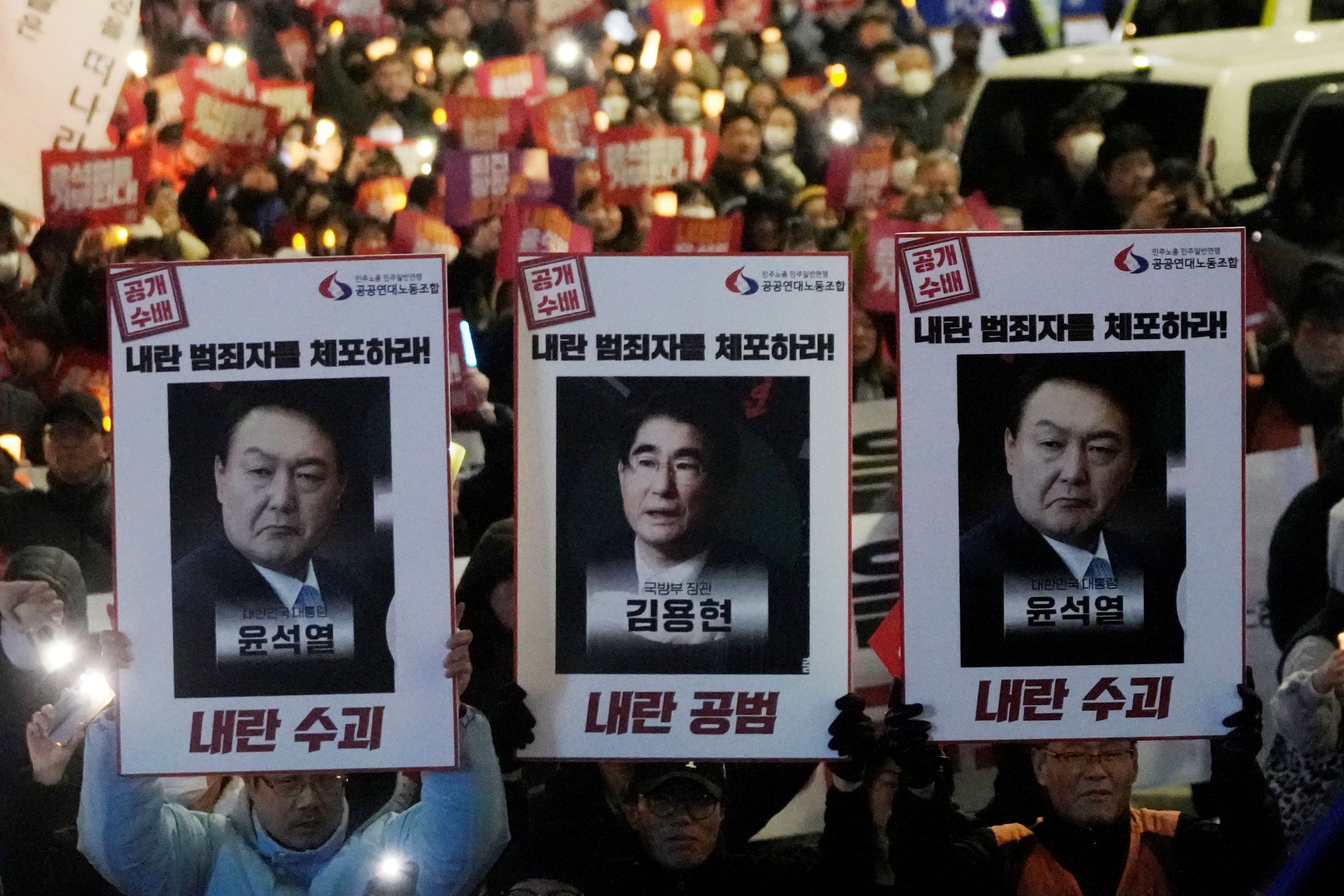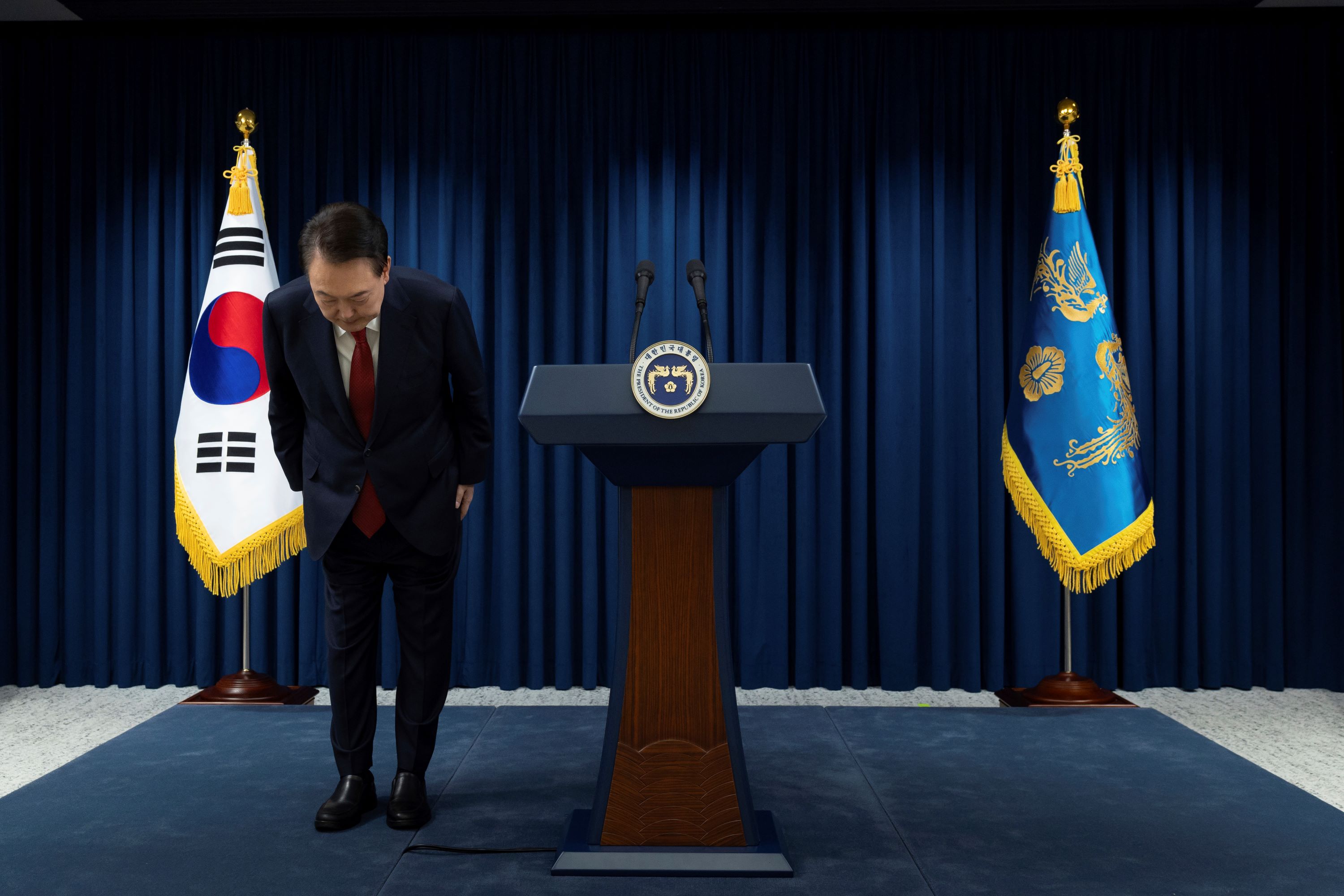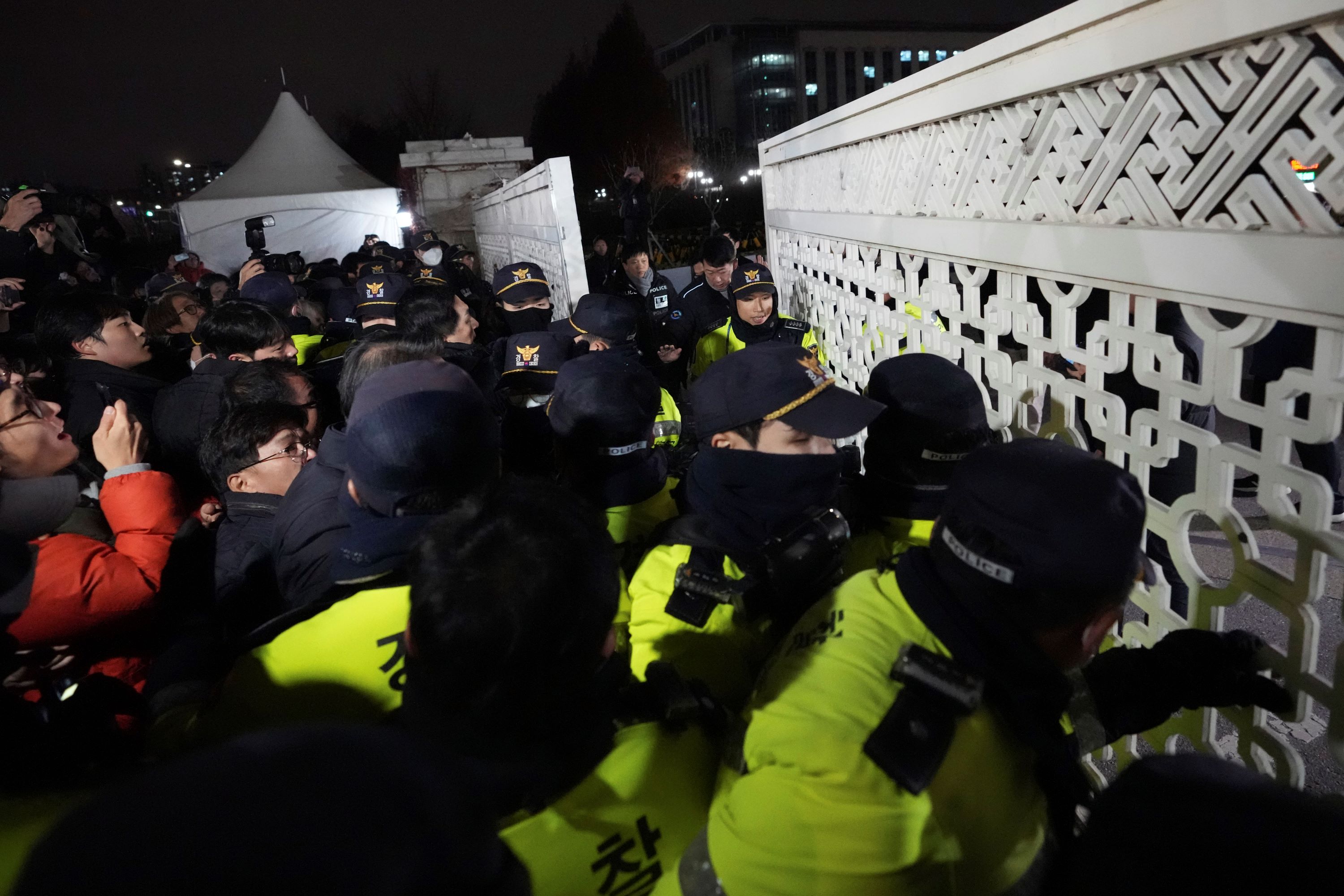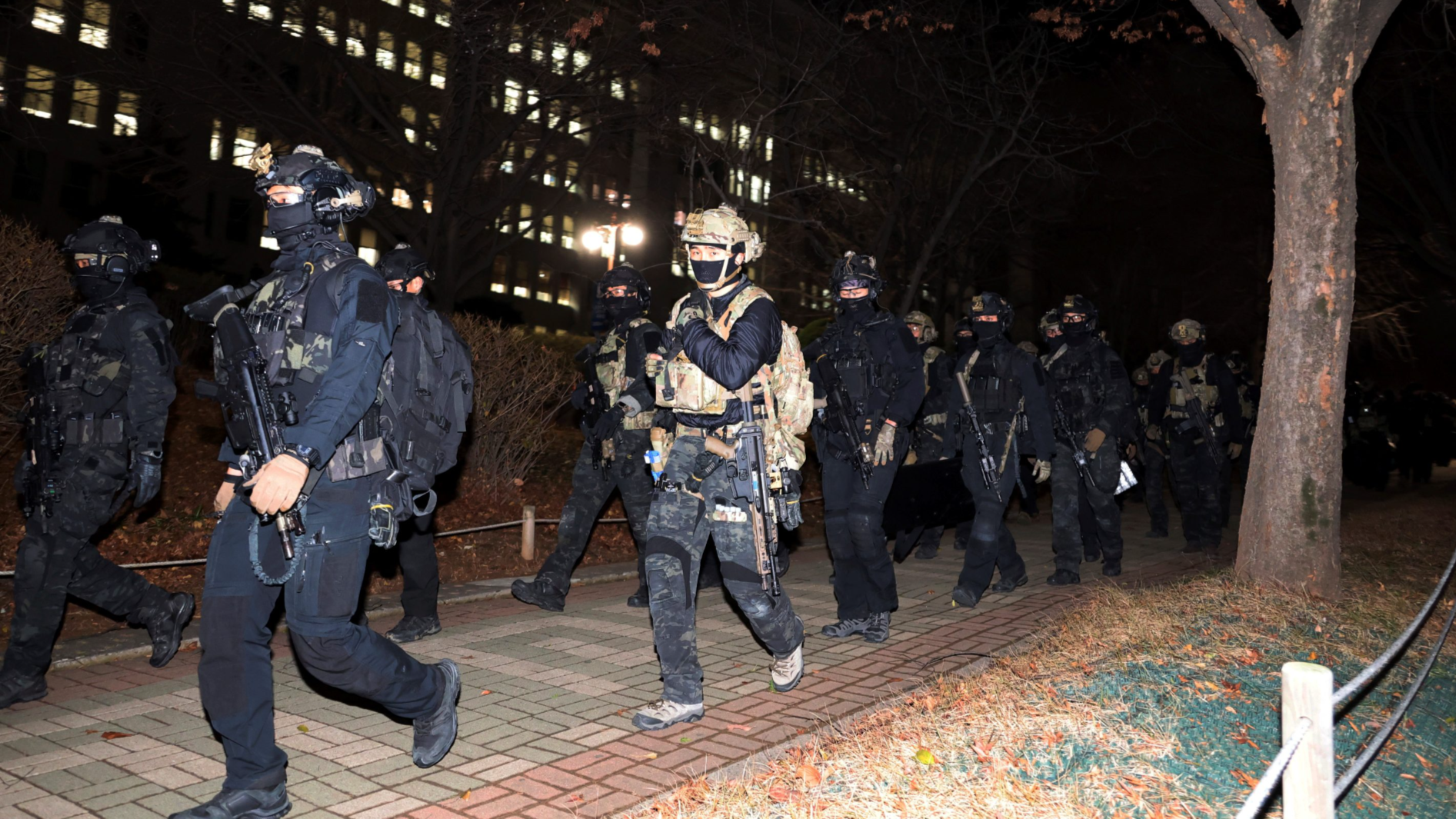
SEOUL - South Korean President Yoon Suk-yeol's ruling party said on Tuesday that it was discussing Yoon's potential resignation as early as February after his botched martial law attempt, and holding a snap election in April or May.
Yoon has apologized for last week's martial law declaration that triggered a political crisis and pledged to leave his fate to his People Power Party (PPP) but has not resigned.
He is now the subject of criminal investigations over insurrection charges, was banned from leaving the country, and faces a second impeachment vote planned for Saturday.
Lee Yang-soo, who chairs a PPP task force launched on Monday to map out Yoon's eventual and "orderly" departure, said his team proposed the idea of having Yoon resign in February or March and holding an election two months later.
South Korea's constitution requires an election within 60 days of his departure if Yoon leaves office before his single five-year term ends in May 2027.
"We've not yet reached a conclusion partywide and will have another meeting with all our members of parliament in the afternoon to discuss that plan," Lee told reporters.
ALSO READ: S. Korea's Yoon faces impeachment vote, investigation for treason
The idea came three days after PPP leader Han Dong-hoon said the president would be excluded from foreign and other state affairs, and Prime Minister Han Duck-soo would oversee the government.
The main opposition Democratic Party (DP) criticized the announcement, saying it is unconstitutional and Yoon must be impeached or resign and face legal prosecution. It plans to table another impeachment bill on Saturday after last week's first vote failed due to the PPP's boycott.
When asked about the PPP's proposal, DP leader Lee Jae-myung told reporters that he was unsure if the public will accept the idea of "keeping such a serious criminal in office until then".
READ MORE: K-pop light sticks fire up Yoon's impeachment protests in South Korea
A DP spokesperson also issued a statement dismissing the plan as "absurd", saying the PPP has no authority to craft any roadmap for Yoon's departure and the only available option is to impeach him.
Kim Seon-taek, a professor at Korea University's law school, said the president can delegate authority to the prime minister. Chang Young-soo, another professor from the same school, echoed Kim's view but said there is debate on whether the prime minister has authority to act as head of state on diplomatic matters.
Growing dissent
There is growing dissent within the ruling camp, after only two of the 108 PPP lawmakers said they participated and voted for the impeachment motion last week.
The bill requires support from two-thirds of the single-chamber, 300-seat assembly to pass, which means at least eight would have to join the opposition.

On Tuesday, Kim Sang-wook became the third PPP lawmaker to openly declare support for the motion after opposing it in the first vote.
Another member Bae Hyun-jin also criticized last week's boycott and vowed to join on Saturday, while Cho Kyoung-tae said he would also vote if Yoon does not resign before then, but did not say on which side.
ALSO READ: South Korea rushes to stabilize markets after Yoon's martial law bid
Kim, speaking at a news conference, said other PPP members are likely to join him, adding: "I think there's a sufficient number to pass impeachment".
Investigation
Also on Tuesday, South Korea's National Assembly passed a resolution calling for the immediate arrest of Yoon and seven other officials over last week's botched martial law declaration.
According to law, a National Assembly resolution, like a bill, is subject to the process of proposal, review by the jurisdiction committee and deliberation by the plenary session, but it will not have legal effect.
The parliament also passed a bill to appoint a standing special prosecutor and investigate Yoon's treason charge, TV footage showed Tuesday.
Among 287 National Assembly lawmakers attending the plenary session, 210 voted in favor and 63 against, with 14 abstentions.
The bill was submitted to the 300-member unicameral parliament last week to get to the bottom of Yoon's rebellion charge caused by his "unconstitutional" martial law declaration.
READ MORE: S. Korea opposition party plans to pass govt budget bill on Tuesday
Subject to the independent counsel investigation will be the embattled president, prime minister, former floor leader of the ruling People Power Party, former defense minister and other military commanders.

Under the standing independent counsel bill that cannot be vetoed by the president, the opposition has the right to recommend a special prosecutor, but the president can delay the appointment of the prosecutor.
Yoon declared an emergency martial law on the night of Dec 3, but it was repealed by the National Assembly hours later.
Meanwhile, South Korean police said they have requested the presence of cabinet members and the spy agency chief for questioning.
The list of 11 officials includes Prime Minister Han Duck-soo, former Defense Minister Kim Yong-hyun, former Interior Minister Lee Sang-min, Foreign Minister Cho Tae-yul and a few other ministers, as well as National Intelligence Service Director Cho Tae-yong.
ALSO READ: Shouting, curses as Yoon’s party boycotts impeachment vote
They are believed to have attended cabinet meetings held in the lead-up to and after Yoon's martial law declaration on Dec 3.
The National Office of Investigation (NOI) handling the case said they are not ruling out taking legal action to compel them to appear for questioning if they refuse to cooperate.

The NOI also said its special investigation team imposed an overseas travel ban on five key police and military officials, including Cho Ji-ho, commissioner general of the Korean National Police Agency, Kim Bong-sik, head of the Seoul Metropolitan Police Agency, and Mok Hyun-tae, head of the National Assembly Police Guards.
READ MORE: S. Korean Justice Ministry imposes travel ban on President Yoon
The travel ban was enforced by the Ministry of Justice at 8 pm local time Monday, the NOI added, noting that the three were allegedly involved in controlling access to the National Assembly during the martial law enforcement on Dec 3.
Meanwhile, Lee Jin-woo, chief of the Capital Defense Command, and Kwak Jong-geun, former chief of the Army Special Warfare Command, have also been placed under a travel ban in connection with the same investigation.
ALSO READ: S. Korean prosecution books Yoon as suspect on treason charges
The NOI said it has asked the defense ministry and several military commands to submit data on the deployment of troops related to the martial law decree.



